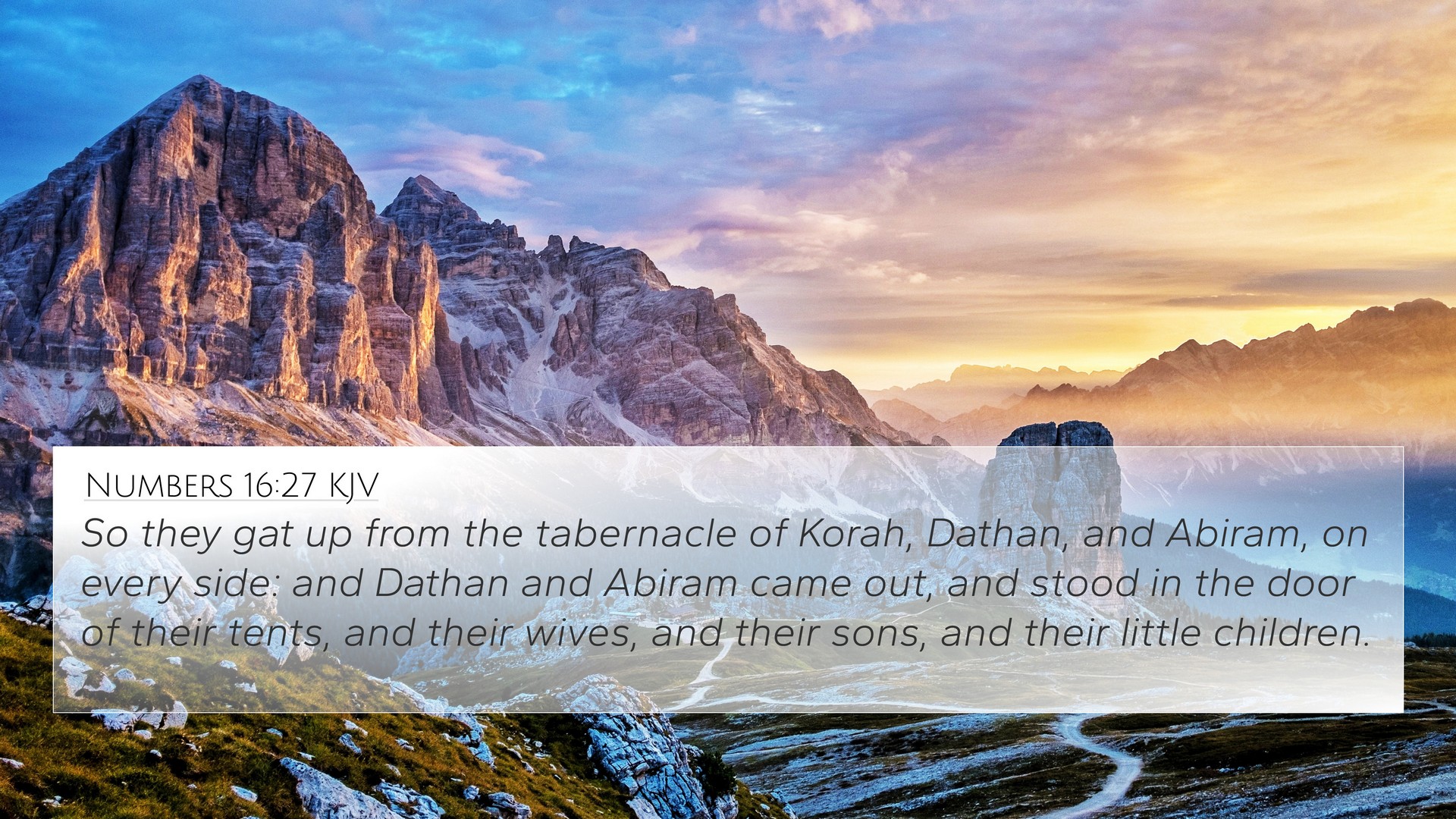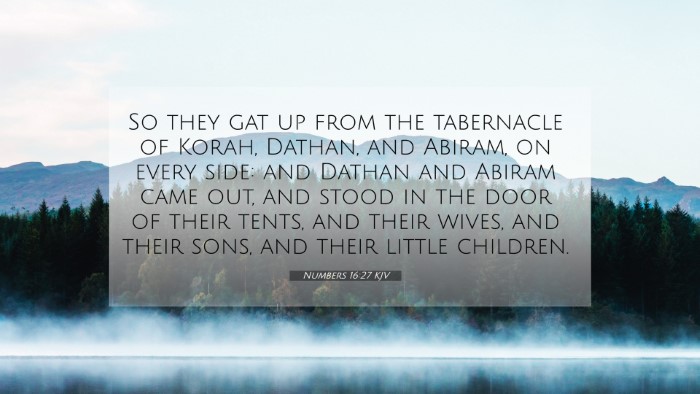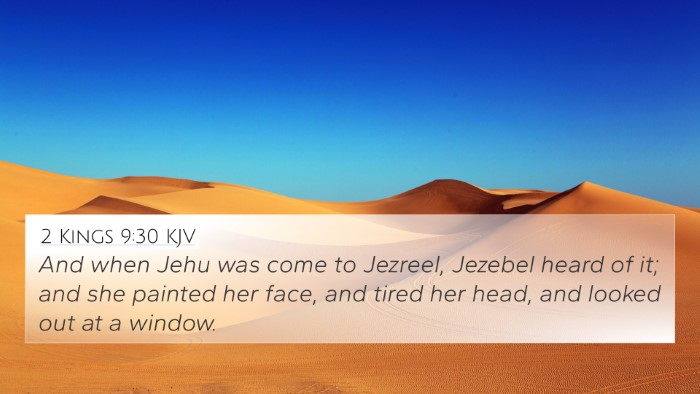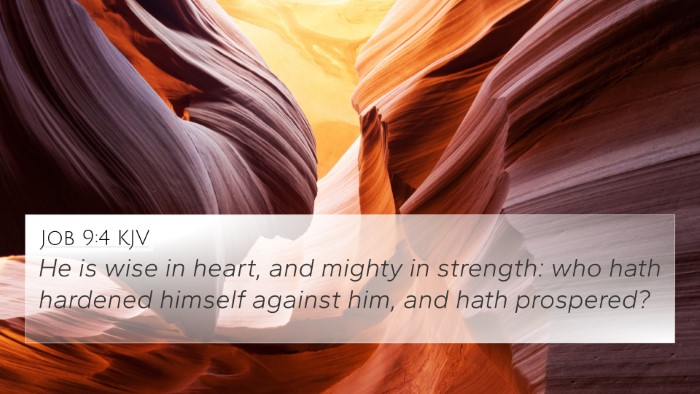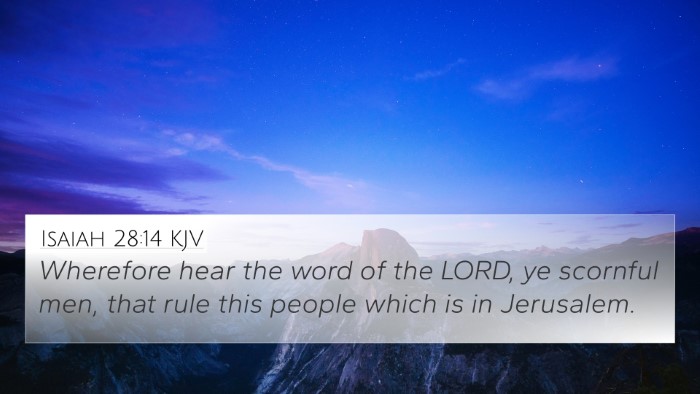Understanding Numbers 16:27
Numbers 16:27 states: "So they got away from the tents of Korah, Dathan, and Abiram; and Dathan and Abiram came out and stood at the door of their tents, along with their wives and their children and their little ones."
This verse captures a significant moment in the narrative of rebellion against Moses’ leadership. Below is a summarized collection of insights derived from public domain commentaries by authors such as Matthew Henry, Albert Barnes, and Adam Clarke.
Verse Context and Significance
The backdrop of Numbers 16 involves Korah, Dathan, and Abiram leading a rebellion against Moses and Aaron. This verse highlights the consequences of their rebellion—a divine judgment that causes them to stand before their tents, representing their alignment with rebellion and its impending doom.
-
Matthew Henry's Commentary:
Henry emphasizes the pride and audacity of Korah and his company. This verse signifies the rejection of their position before God, as they are forced to confront the reality of their choices. The standing at the door of their tents symbolizes their unwillingness to repent and their allegiance to dissent.
-
Albert Barnes’ Notes:
Barnes notes that the scene is one of stark contrast between the faithful and unfaithful. The verse reflects the seriousness of rebellion against Divinely appointed leaders. The inclusion of their families signifies the broader impact of their choices.
-
Adam Clarke’s Commentary:
Clarke highlights the tragic nature of this event. The mention of “little ones” indicates that the consequences of rebellion extend beyond individuals to families. This serves as a grave warning about the repercussions of straying from God’s commands.
Thematic Bible Verse Connections
The themes of rebellion, divine judgment, and consequence are prevalent in Numbers 16:27. This verse invites reflections on several related passages:
- **1 Corinthians 10:10** - Talks about the consequences of murmuring, paralleling the discontent seen in Korah’s rebellion.
- **Jude 1:11** - Refers to the way of Cain, Balaam's greed, and Korah’s rebellion as examples of usurping authority.
- **Hebrews 12:15** - Warns against a bitter root which leads to defiance and rebellion within the community.
- **Proverbs 16:18** - States that pride precedes destruction, resonating with the spirit of Korah's rebellion.
- **Romans 13:2** - Discusses divine authority and its significance, underscoring the consequences of opposing God’s appointed leaders.
- **Numbers 16:20-22** - Offers the context of the divine response to the rebellion, linking directly to the fate of Korah and his followers.
- **Psalm 106:16-17** - Reflects on the discontent among the Israelites, drawing parallels to Korah’s uprising.
Connecting the Scriptural Dots
The rebellion in Numbers 16 speaks to broader themes found throughout the Bible. The insightful cross-references illustrate a theme of warning against rebellion and pride, offering a lens through which to view not only the consequences faced in the Old Testament but also the calls to obedience found in the New Testament.
Understanding the connections between these scriptures provides a richer interpretation of Numbers 16:27 and highlights how essential it is to heed God's divine order.
Tools for Bible Cross-Referencing
For those engaging in deeper scriptural analysis, various tools serve to aid in cross-referencing Bible texts. These may include:
- Bible Concordance: An index of words and their locations in the Bible.
- Bible Cross-Reference Guide: Resources that detail related verses in themes or topics.
- Cross-Reference Bible Study Tools: Various applications and study Bibles that highlight cross-references for readers.
Applying Cross-Referencing Methods
Engaging in a cross-referencing Bible study can enrich understanding, providing a pathway to explore related meanings and interpretations. It is a method that encourages readers to not just stay within a single passage but to explore the interconnectedness of scripture.
Conclusion: The Importance of Understanding
Numbers 16:27 serves as a poignant reminder of the consequences of rebellion and the need for adhering to God’s appointed authorities. Through the application of cross-referencing these scriptures, we gain profound insights that contribute to both personal faith and communal understanding.
